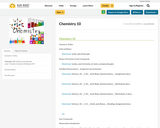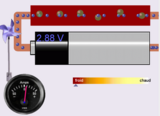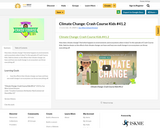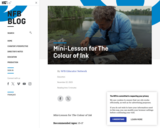
Chemistry 10 files:
- Subject:
- Chemistry
- Science
- Material Type:
- Activity/Lab
- Homework/Assignment
- Date Added:
- 10/21/2018

Chemistry 10 files:

It's not just for kids, it's for everyone. If you are looking for basic chemistry help and information, stay on this site. We have information on matter, atoms, elements, the periodic table, reactions, and biochemistry. If you're not sure what to click, try our site map that lists all of the topics on the site. If you get lost in all of the information, use the search function at the top or bottom of each page.

Hank introduces us to ourselves by taking us on a journey through the fascinatingly diverse phyla known as chordata. And the next time someone asks you who you are, you can give them the facts: you're a mammalian amniotic tetrapodal sarcopterygian osteichthyen gnathostomal vertebrate cranial chordate.

Radio, Cinema, and Television have been staples in news coverage, entertainment, and education for almost 100 years. But... where did they all come from? Who started what and when and why? In this episode, Hank Green talks to us about their birth and a dead elephant.

Une série de simulations provenant de l’Université de Colorado à Boulder pour les 9e – 12e au sujet des sciences. Cette simulation démontre le processus de circuit batterie-résistance.
Regardez à l'intérieur d'une résistance pour comprendre son fonctionnement. Augmentez la tension de la batterie pour faire passer davantage d'électrons à travers la résistance. Augmentez la résistance pour bloquer le flux d'électrons. Observez le changement de courant et la température de la résistance.

Hank takes us on a trip around the body - we follow the circulatory and respiratory systems as they deliver oxygen and remove carbon dioxide from cells, and help make it possible for our bodies to function.

We’re beginning our engineering journey with a tour through the major branches. Today Shini explains the facets of civil engineering, including structural and construction engineering, city planning, transportation, and sanitation.

In this video, Bill Nye, the Science Guy, explains what causes climate change, how it affects our planet, why we need to act promptly to mitigate its effects, and how each of us can contribute to a solution.

How does climate change? And what happens to environments and ecosystems when it does? In this episode of Crash Course Kids, Sabrina shows us the effects that climate change can have and how one small change in an ecosystem can throw everything off.

This site offers daily free science or cooking experiments to do at home.

Jason Logan is a Toronto-based artist, inkmaker and forager. He began his career as an illustrator in New York City and became interested in natural sources of pigment when his children were born. This documentary, organized by colour, takes us into Jason’s world, highlighting his curiosity, spirit of experimentation and creativity as he gathers natural and botanical materials throughout his travels and transforms them into ink, working like a mad scientist of sorts. For Jason, the creation of ink becomes a vehicle for connecting and relationship building with artists and other creatives from around the world. This mini lesson invites students to analyze where art materials come from by looking at the impact of drawing on the natural world to make ink. They will also explore concepts of permanence and ephemerality and can engage in geographically tracking the movement of Logan’s inks from place to place. The mini lesson also creates opportunities for students to research an individual artist represented in the film, and finally to work in pairs to make ink for one another.

Over the last four episodes, we’ve examined some of the stories that make up the idea of a “revolution” in knowledge-making in Europe. But we can’t understand this idea fully, without unpacking another one—the so called Age of Exploration. This encompasses a lot of events that happened from 1400 through the 1600s and were driven in part by new ideas about knowledge-making.

Interactions between species are what define ecological communities, and community ecology studies these interactions anywhere they take place. Although interspecies interactions are mostly competitive, competition is pretty dangerous, so a lot of interactions are actually about side-stepping direct competition and instead finding ways to divvy up resources to let species get along. Feel the love?

Hank gets to the more violent part of community ecology by describing predation and the many ways prey organisms have developed to avoid it.

An inquiry-based project to map the land in your community. The key concepts in this unit are grounded in Indigenous beliefs of interconnectedness, connectedness, and respect for all things.
The driving inquiry questions for this unit are:
1. How can respect for the land be shown?
2. What do we look for when setting up a camp?
3. What stories or teachings are connected to key locations in and around our community?
4. How has the land around our community changed over time?
5. Who do we share our community’s lands with?

iNaturalist is an identification key for plants, protist, fungi and animal species. It has online features as well as an app for Apple or Android, and is a joint initiative between California Academy of Sciences and the National Geographic Society.

Hank introduces us to comparative anatomy, which studies the similarities and differences in animal anatomy to support the theory of evolution and the shared ancestry of living things.

Hank continues our exploration of animal phyla with the more complexly organized annelida and arthropoda, and a biolography on insects.

Experiment with conductivity in metals, plastics and photoconductors. See why metals conduct and plastics don't, and why some materials conduct only when you shine a flashlight on them.

Hank wraps up the Crash Course on ecology by taking a look at the growing fields of conservation biology and restoration ecology, which use all the kung fu moves we've learned about in the past eleven weeks and apply them to protecting ecosystems and to cleaning up the messes that we've already made.